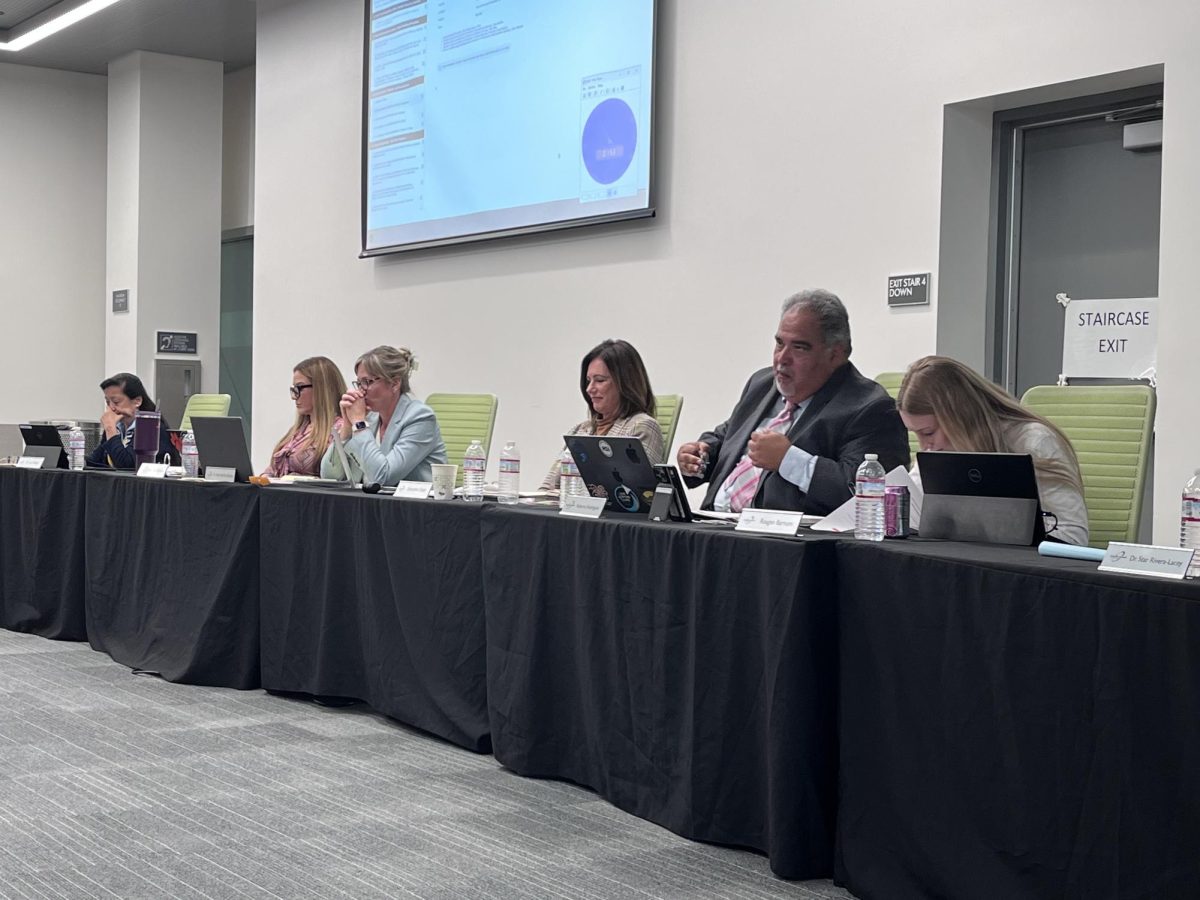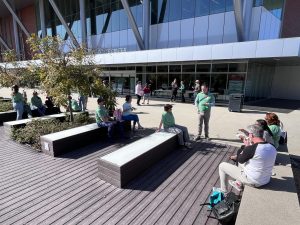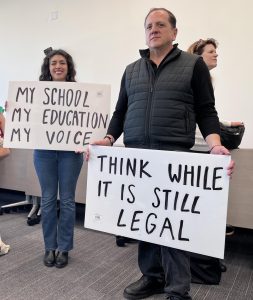
Cyndi Cunningham
From left to right, Trustee Judy Patacsil, Board Secretary Yvette Acosta, Vice President Holly Hamilton-Bleakley, President Jacqueline Kaiser, Trustee Roberto Rodriguez, and Student Trustee Reagan Barnum at the April 8 meeting.
SAN MARCOS — A narrow vote to stop reading land acknowledgments at Palomar College board meetings has drawn backlash from students, faculty, and trustees who believe it weakens the college’s commitment to Indigenous communities.
While the April 8 board meeting covered several topics, the board’s debate over continuing to recite the land acknowledgment dominated the session. In a 3-2 vote, the board decided to discontinue the practice at all future meetings. President Jacqueline Kaiser, Vice President Holly Hamilton Bleakley, and Board Secretary Yvette Acosta supported the change, while Trustees Roberto Rodriguez and Judy Patacsil voted to keep the practice in place.
“This is a promise that we made working with all the tribes in our region to develop this land acknowledgment … Palomar College was going to not only read it … There’s a commitment in this to our students, to our tribes, to our community, to include them and make sure that the work that we do is to help our students succeed,” Trustee Rodriguez said during the discussion before the vote.
The recital of the land acknowledgment at Palomar College Governing Board meetings began in 2021. The statement was developed by the college’s Native American Advisory Council, as a collaboration between Palomar’s leaders and local tribes, to recognize that the campus sits on the ancestral land of Native American tribes that continue to reside in the region.
Board Secretary Yvette Acosta opened the discussion on the land acknowledgment.
“I believe the board should retain full autonomy over the content of its meeting agenda … Our primary responsibility is to focus on policies, the decisions and the actions that directly impact the success of our students … When symbolic items become automatic, they lose their impact,” Acosta said.
Acosta originally asked for the land acknowledgment to be discussed at the March 11 meeting, prompting its addition to the April meeting.
Acosta has previously raised concerns about Palomar’s agreements with local tribes. In the February meeting, she also questioned the cost of a contract between Palomar College and Helix Environmental Planning for construction at the Fallbrook Educational Center.
The contract provided tribal, archeological, and paleontological monitoring over the construction according to California law, according to Interim Vice President of Finance Chris Yatooma.
At the April meeting, Board President Jacqueline Kaiser added that a governing board meeting is not the appropriate setting for symbolic gestures and disagreed that this would negatively impact student success.
“It’s not a message of disrespect because nothing changes in how money comes into the college or grants are received,” Kaiser said. “So, I don’t see it in a negative way. But I think it’s just helping to focus on what we’re here for and our purpose as board trustees.”
In January, Palomar College received a $1.5 million grant from the Native American Student Support and Success Program (NASSSP). Trustee Rodriguez argued that pulling the land acknowledgment from the meeting could impact similar funding opportunities, and Trustee Judy Patacsil shared that concern.
“For us to not read the land acknowledgment is taking away from the college in terms of what could happen in regards to the grant, but also in terms of the students that we serve,” Patacsil said.
Supporters of the land acknowledgment expressed concern about what message this would send to the students.
“I think we’re sending a negative message. We’re portraying a negative image by doing away with the land acknowledgment,” Student Trustee Reagan Barnum said.
Barnum cast her advisory vote in favor of keeping the land acknowledgment.
Board Vice President Holly Hamilton-Bleakley said the change does not contradict Palomar’s values and emphasized the land acknowledgment would still be read in classrooms and campus events. It was only being removed from board meetings.
She also noted that land acknowledgments are a vital tool for generating conversations about past injustices, but the conversation is for the classroom.

“Not that we can’t talk about injustices here, we can. But this is not a classroom; it’s a board meeting,” Hamilton-Bleakley said.
Before the meeting, ESL Instructor and Full-Time President of the Palomar Faculty Federation (PFF) Lawrence Lawson invited all staff members to join PFF for a pizza party outside of the Learning Resource Center. PFF expressed concern about hostility toward Diversity, Equity, and Inclusion (DEI) initiatives on campus.
“We want to make sure that people are here to hear that conversation because the land acknowledgment has history in Palomar College … To have this discussion, it perhaps indicates an agenda. And we want to make sure that our faculty are there just as a witness,” Lawson said.

More than just faculty and staff attended the meeting.
Palomar student Abigail Palma-Sigmond attended the meeting because she’s been concerned about the recent actions taken by the Trump administration against the U.S. Department of Education. She expressed worry that what’s happening at the federal level will trickle down and impact daily student life. She referenced faculty frustration with the board’s recent actions, including the delay of the curriculum approval in January.
“Knowing that in-state representatives like the Governing Board here have a direct impact on the community and Palomar College… [Being here] is the best direct way to make advocacy and send that strong image of it’s my school, my education, my voice,” Palma-Sigmond said.
The next Governing Board meeting is scheduled for May 13 at 5 p.m. in room LRC-438. It will also be available to watch on Zoom. For more information, visit BoardDocs.
CORRECTIONS: A correction was made to this story on April 14, 2025 @ 12:36 p.m.